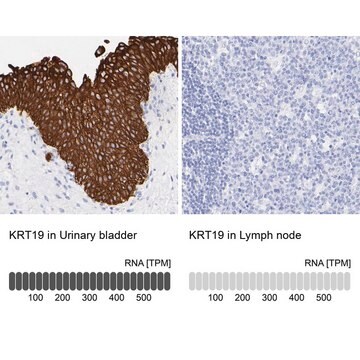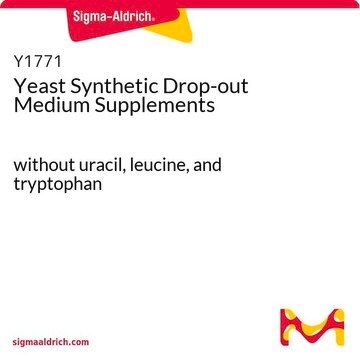319R-2
Cytokeratin 19 (EP72) Rabbit Monoclonal Primary Antibody
Synonym(s):
40-kDa keratin intermediate filament, CK-19, CK19, K19, K1CS, KRT 19, cytokeratin-19, keratin 19, type 1, keratin, type 1, 40-kd, keratin-19
About This Item
Recommended Products
biological source
rabbit
Quality Level
100
500
conjugate
unconjugated
antibody form
culture supernatant
antibody product type
primary antibodies
clone
EP72, monoclonal
description
For In Vitro Diagnostic Use in Select Regions (See Chart)
form
buffered aqueous solution
species reactivity
human
packaging
vial of 0.1 mL concentrate (319R-24)
vial of 0.1 mL concentrate Research Use Only (319R-24-RUO)
vial of 0.5 mL concentrate (319R-25)
vial of 1.0 mL concentrate (319R-26)
vial of 1.0 mL concentrate Research Use Only (319R-26-RUO)
vial of 1.0 mL pre-dilute Research Use Only (319R-27-RUO)
vial of 1.0 mL predilute ready-to-use (319R-27)
vial of 7.0 mL pre-dilute ready-to-use Research Use Only (319R-28-RUO)
vial of 7.0 mL predilute ready-to-use (319R-28)
manufacturer/tradename
Cell Marque™
technique(s)
immunohistochemistry (formalin-fixed, paraffin-embedded sections): 1:50-1:200 (concentrated)
isotype
IgG
control
bladder, colon, colon carcinoma, thyroid carcinoma
shipped in
wet ice
storage temp.
2-8°C
visualization
cytoplasmic
Gene Information
human ... KRT19(3880)
General description
Quality
Canada - IVD
European Union - IVD
Japan - RUO
Linkage
Physical form
Concentrate: diluted in Phosphate Buffered Saline, pH 7.2, with 1% BSA and <0.1% Sodium Azide
Preparation Note
Note: This requires a keycode which can be found on your packaging or product label.
Download the latest released IFU
Note: This IFU may not apply to your specific product lot.
Other Notes
Legal Information
Not finding the right product?
Try our Product Selector Tool.
Storage Class Code
12 - Non Combustible Liquids
WGK
WGK 2
Flash Point(F)
Not applicable
Flash Point(C)
Not applicable
Certificates of Analysis (COA)
Search for Certificates of Analysis (COA) by entering the products Lot/Batch Number. Lot and Batch Numbers can be found on a product’s label following the words ‘Lot’ or ‘Batch’.
Already Own This Product?
Find documentation for the products that you have recently purchased in the Document Library.
Our team of scientists has experience in all areas of research including Life Science, Material Science, Chemical Synthesis, Chromatography, Analytical and many others.
Contact Technical Service







